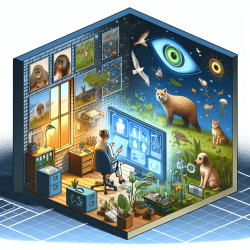The COVID-19 pandemic has been a defining moment in recent history, not only for its impact on human health but also for its profound effects on ecological systems worldwide. As practitioners in various fields, including online therapy services like those offered by TinyEYE, we can glean valuable insights from these changes to improve our skills and adapt to new challenges.
Understanding the Ecological Impact
The pandemic led to a significant reduction in human activity, offering a unique opportunity to observe nature's response. According to the research paper "The conservation and ecological impacts of the COVID-19 pandemic," this period served as a global experiment that revealed both positive and negative impacts on biodiversity.
- Positive Effects: Reduced human presence in natural areas allowed ecosystems to recover. For instance, coral reefs in Israel saw increased fish species richness during lockdowns when tourism was suspended.
- Negative Effects: The absence of tourists led to increased disturbances by predators in some areas, such as seabird colonies in Sweden.
These findings underscore the complex relationship between human activity and ecological health. As practitioners, we can apply this knowledge to develop more sustainable practices and encourage further research into human-environment interactions.
Leveraging Technology for Conservation
The pandemic highlighted the importance of technology in monitoring wildlife and ecosystems. Acoustic monitoring systems and camera traps became essential tools when fieldwork was restricted. These technologies provide continuous data collection, allowing researchers to track changes in wildlife behavior and population dynamics.
For practitioners, embracing technology can enhance data-driven decision-making. Whether it's using online platforms for therapy sessions or employing digital tools for environmental monitoring, integrating technology into our practice can lead to more effective outcomes.
Encouraging Further Research
The preliminary findings from the pandemic's impact on ecosystems call for continued research. Practitioners should consider collaborating with researchers to explore new methods for conservation and sustainability. By participating in citizen science initiatives or supporting academic studies, we can contribute to a deeper understanding of ecological dynamics.
Moreover, engaging with interdisciplinary teams can provide fresh perspectives and innovative solutions. Networking with professionals from diverse fields can lead to collaborations that address complex environmental challenges.
A Call to Action
The pandemic has taught us that nature is resilient but requires our support to thrive. As practitioners, we have a role to play in promoting sustainable practices and educating others about the importance of conservation. By incorporating these insights into our work, we can foster a healthier relationship between humans and the environment.
To read the original research paper, please follow this link: The conservation and ecological impacts of the COVID-19 pandemic.










